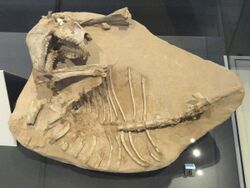Biology:Merychyus
| Merychyus | |
|---|---|

| |
| M. elegans fossil, Royal Ontario Museum | |
| Scientific classification | |
| Domain: | Eukaryota |
| Kingdom: | Animalia |
| Phylum: | Chordata |
| Class: | Mammalia |
| Order: | Artiodactyla |
| Family: | †Merycoidodontidae |
| Genus: | †Merychyus Leidy 1858 |
| Type species | |
| †Merychyus elegans Leidy 1858
| |
| Species | |
| |
| Synonyms | |
| |
Merychyus is an extinct genus of oreodont of the family Merycoidodontidae, endemic to North America. It lived during the Miocene, 20.4—10.3 mya, existing for approximately 10 million years.[1] Fossils are widespread through the central and western United States.
Merychyus was a herbivore with a short face, tusk-like canine teeth, heavy body, long tail, short feet, and four-toed hooves.[citation needed]
Paleoecology
Fossils of Merychyus have been uncovered from Agate Fossil Beds National Monument.[2] Merychyus was a common prey item for the beardog Daphoenodon, as over half of all herbivore remains uncovered from Daphoenodon burrows at Agate Fossil Beds belonged to Merychyus.[3]
Fossil distribution
Fossils of the genus have been found in:[1]
- Arikareean
- Chalk Canyon Formation, Arizona
- Diligencia, Sespe & Tick Canyon Formations, California
- Arikaree Formation, North Dakota
- John Day Formation, Oregon
- Delaho Formation, Texas
- Colter, Harrison & Marsland Formations, Wyoming
- Harrisonian
- Hector Formation, California
- Agate Springs, Harrison, Marsland & Wildcat Hills Beds Formations, Nebraska
- Rosebud Formation, South Dakota
- Delaho Formation, Texas
- Harrison & Marsland Formations, Wyoming
- Other Miocene
- Cypress Hills Formation, Hemingfordian Saskatchewan, Canada
- Suchilquitongo Formation, Mexico
- Barstow, Bopesta, Branch Canyon, Hector, Kramer Beds & Vaqueros Formations, California
- Browns Park & Pawnee Creek Formations, Colorado
- Railroad Canyon Beds Formation, Idaho
- Fleming Formation, Louisiana
- Runningwater, Sheep Creek, Olcott, Loop Fork, Box Butte, Valentine & Ash Hollow Formations, Nebraska
- Truckee & Monarch Mill Formations, Nevada
- Tesuque, Zia Sand & Abiquiu Formations, New Mexico
- Laverne Formation, Oklahoma
- Juntura & John Day Formations, Oregon
- Arikaree & Batesland Formations, South Dakota
- Goliad Formation, Texas
- Marsland, Colter, North Park, Arikaree & Carpenter Ranch Formations, Wyoming
References
- ↑ 1.0 1.1 Merychyus at Fossilworks.org
- ↑ Hunt Jr, R.M., 1990. Nebraska and Wyoming; A paleobiota entombed in fine-grained volcaniclastic rocks. Volcanism and Fossil Biotas, 244, p.69.
- ↑ Hunt Jr, R.M., Skolnick, R. and Kaufman, J., 2019. The Carnivores of Agate Fossil Beds National Monument. Lulu. com.
Bibliography
- J. Leidy. 1858. Notice of Remains of Extinct Vertebrata, from the Valley of the Niobrara River, Collected during the Exploring Expedition of 1857, in Nebraska, under the Command of Lieut. G. K. Warren, U. S. Top. Eng., by Dr. F. V. Hayden, Geologist to the Expedition. Proceedings of the Academy of Natural Sciences of Philadelphia 10:15-89
Hunt Jr, R.M., 1990. Nebraska and Wyoming; A paleobiota entombed in fine-grained volcaniclastic rocks. Volcanism and Fossil Biotas, 244, p.69. Hunt Jr, R.M., Skolnick, R. and Kaufman, J., 2019. The Carnivores of Agate Fossil Beds National Monument. Lulu. com. Wikidata ☰ Q16985417 entry
 |

